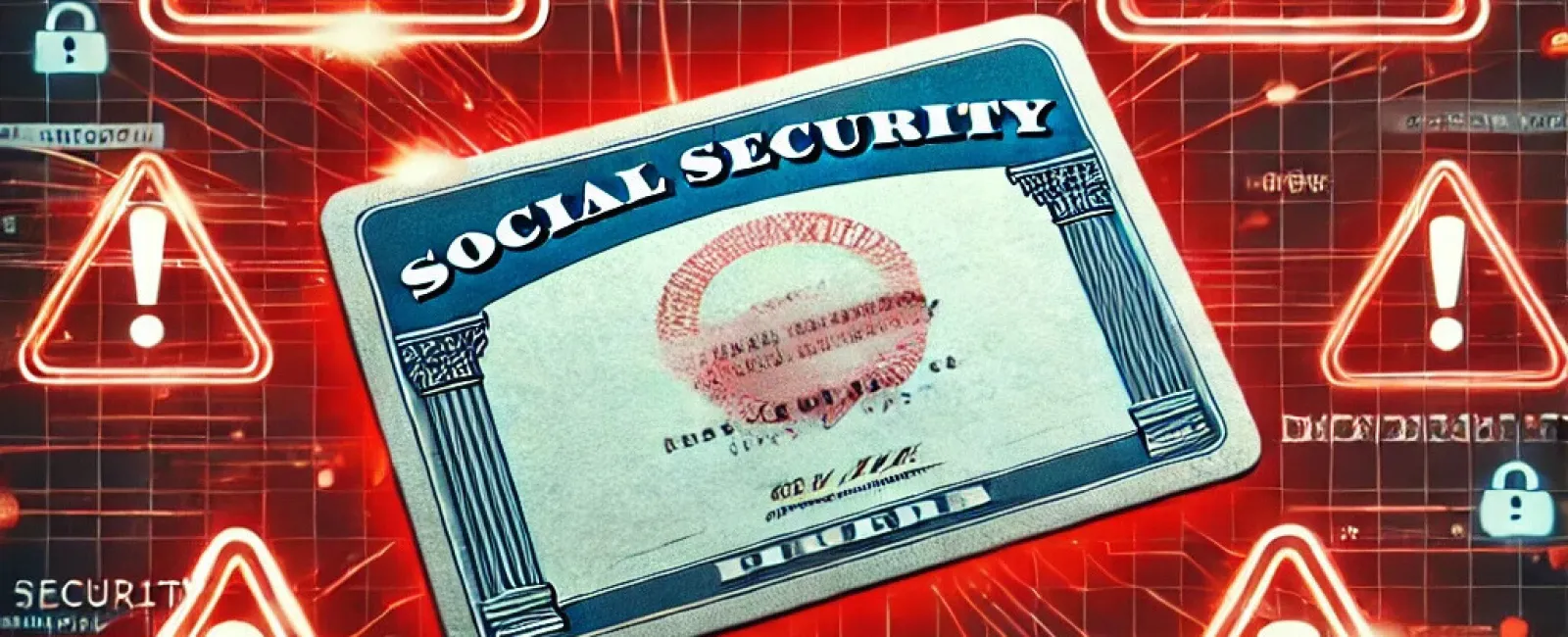December 23, 2024
At this point, many people's Social Security numbers (SSNs), one of the most critical pieces of personal data, have ended up on the dark web. Due to breaches at major corporations, government websites, and healthcare providers, millions of SSNs circulate among cybercriminals. While this is alarming, is it really a significant concern?
The answer is a resounding yes. Here's why a compromised SSN can cause serious issues in your life, how to determine if yours has been exposed, and what steps to take if it has.
Is a Leaked Social Security Number Really That Serious?
In the US, your Social Security number is a vital component of your identity. With just your SSN, a hacker can access a vast array of financial and personal information, enabling them to impersonate you, secure loans, and potentially access sensitive accounts. Even if the effects aren't immediate, criminals can hold onto SSNs for years, waiting for the perfect opportunity to exploit them.
What Can Happen If Someone Has Your Social Security Number?
If your SSN falls into the wrong hands, it can lead to:
- Identity Theft: Criminals can use your SSN to open credit accounts, secure loans, or even file fraudulent tax returns in your name.
- Employment Fraud: Someone might use your SSN to obtain a job, potentially causing unexpected tax complications for you.
- Medical Fraud: Some criminals use stolen SSNs to receive healthcare services under another person's name, resulting in inaccurate medical records that can complicate future care.
Consider the Equifax data breach in 2017, which exposed the SSNs and personal information of 147 million people. Many of those affected faced issues ranging from fraudulent credit card applications to false tax returns, with some still dealing with the consequences today. The Equifax incident underscores the seriousness of SSN exposure and proves it can happen.
Signs Your Social Security Number Has Been Stolen
Concerned that your SSN might already be misused? Here are some warning signs to watch for:
- Unexpected Mail: Receiving credit card offers, debt collection notices, or bills for accounts you didn't open.
- Credit Report Surprises: Discovering accounts or inquiries from unfamiliar sources on your credit report.
- Tax Return Issues: Being notified by the IRS of multiple tax returns filed under your name, or being denied an expected refund.
- Health Care Records: Noticing unfamiliar medical bills or strange entries in your medical records.
How to Check If Your SSN Was Leaked - And What You Can Do to Protect It
Whether you've noticed some of these warning signs or just want to be cautious, here are a few steps to check and protect yourself:
- Monitor Your Credit Report: Begin by reviewing your credit report for any unfamiliar accounts. You are entitled to a free credit report annually from each of the major credit bureaus (Experian, TransUnion, and Equifax). Regularly check these reports for unusual activity.
- Use an Identity Theft Protection Service: Services like Experian IdentityWorks or LifeLock can monitor your SSN and alert you to suspicious activity. While they can't prevent identity theft, they can help you detect and address issues more quickly.
- Freeze Your Credit: Freezing your credit is one of the most effective ways to prevent fraud. A freeze restricts access to your credit report, making it much harder for someone to open accounts in your name. You can freeze and unfreeze your credit for free through each of the three major credit bureaus.
- Sign Up for SSN Alerts: The Social Security Administration offers alerts for certain types of activity, like changes to your Social Security account. While not comprehensive, it adds an extra layer of awareness to help you catch fraud early.
What to Do Immediately If Your SSN Is Leaked
If you confirm that your SSN is compromised, take these actions right away:
- File a Report with the FTC: Visit IdentityTheft.gov to file a report with the Federal Trade Commission. This site will guide you through a recovery plan tailored to your situation.
- Contact the Credit Bureaus: Inform the credit bureaus (Experian, Equifax, and TransUnion) that your SSN has been compromised. Place a fraud alert on your credit report to ensure lenders take extra steps to verify your identity before issuing credit.
- Freeze Your Credit: If you haven't already, place a freeze on your credit report to prevent new accounts from being opened in your name.
- File a Police Report: If the identity theft has resulted in financial loss or involves criminal activity, consider filing a report with your local police department. This can provide useful documentation for resolving issues with creditors.
- Notify Financial Institutions: Contact your bank and other financial institutions where you have accounts to inform them that your SSN has been compromised. They can place alerts on your accounts and monitor for suspicious activity.
Protecting Your Business: Why Cybersecurity Matters
For small and medium-sized businesses, safeguarding Social Security numbers and other personally identifiable information is crucial for business security. A compromised SSN can lead to various security risks, including employee and client identity theft, unauthorized access to financial accounts, and potential data breaches. Since businesses often store sensitive employee and client information, an SSN leak can expose not only individuals but also the business itself to legal and financial risks, as well as reputational damage.
Ensuring your business has a robust cybersecurity plan, including data encryption, network security, and employee education, is the best way to protect sensitive information and prevent data leaks.
If you need help securing your business against data breaches and identity theft, our cybersecurity team is here to support you. Click here or give us a call at 859-245-0582 to schedule a FREE Consult and safeguard your business from costly cyberthreats.





